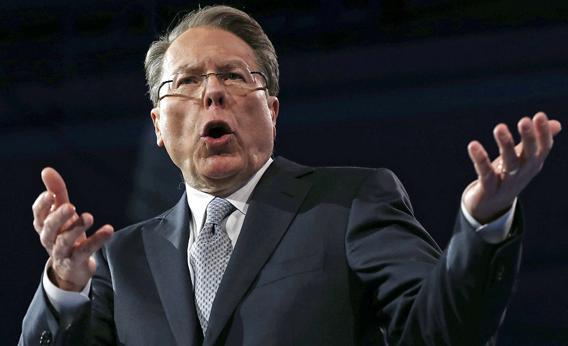“I ask every American to find out where your member of Congress stands,” said President Obama. In the east room of the White House, flanked by the grieving-but-stalwart family of gun-crime victims, the president was talking—again—about universal background checks. “If they’re not part of that 90 percent who agree that we should make it harder for a criminal or somebody with a severe mental illness to buy a gun, then you should ask them, why not? Why are you part of the 10 percent?”
Democrats have clung to that 90 percent number like the last life vest off a downed aircraft carrier. After the Newtown massacre, sure, some of their congressional leaders would introduce assault weapons bans, and magazine clip restrictions, and other pieces of gun legislation that couldn’t pass. The party would debate this in public, then triage, then focus on passing background checks. How could Republicans seriously oppose background checks? Even the donor class was in on the plan.
The problem: 90 percent doesn’t always mean “90 percent.” On Thursday morning, Quinnipiac University released a poll that asked a follow-up to the background checks question. Nine in 10 backed the concept, but 48 percent of people worried that the state would “use that information in the future to confiscate legally owned guns.” By a 15-point margin, independents agreed: The suede-denim secret police might want to take their weapons.
Did Democrats not know this was going to happen? Ask any NRA spokesman, and he’ll repeat it: Background checks lead inexorably to a national gun registry and firearm reclamation campaign, right in time for the apocalypse. Wayne LaPierre was predicting this long before Barack Obama became president. “If the text of the Magna Carta was added to a gun bill,” says Jim Kessler, vice president of policy for the Third Way think tank, “the NRA would call it a gateway to a gun registry.”
Here’s what they mean. There is no “national gun registry.” The 1986 Firearm Owners Protection Act explicitly prohibits it. The working version of the background checks bill, S. 374, does not create a national registry. It gets around the problem of regulating gun show or person-to-person gun sales by preventing sales “unless a licensed importer, licensed manufacturer, or licensed dealer has first taken possession of the firearm.”
This is problematic, and demands a level of bureaucracy that Americans aren’t used to. Of course it does; it was introduced by Democrats. “When you talk about background checks, what are you talking about?” says Newt Gingrich, whose general rule of politics is to pick an issue with supermajority support and stick to it. “My grandson was given a shotgun by his father. Now, if I decide to give a shotgun to my grandson, do I have to get a background check?”
The phantom “national gun registry” could fix that—but again, it’s not part of this bill. Right now, when you go to buy your Bushmaster, you submit to a background check by signing ATF form 4473. That records your personal information, but it stays—for 20 years—with the registered gun seller. “After 20 years, the seller can burn it, shred it, whatever,” says Steve Schneider, owner of Atlantic Guns in Silver Spring, Md. “The federal government can’t just come in and say they want to see all of your records. They can see it as part of a criminal investigation, because the background check isn’t registering the gun. It’s approving the person who bought it.”
And after a person passes the background check, getting the information about him means showing up, with a legal justification. In the NRA’s nightmare scenario, without some repeal of the 1986 law, government agents would need to raid gun shops to find out where gun owners lived and kick off the Great Confiscation. I asked Charles Steele, owner of Steele’s Gun Shop in Lewes, Del., how that might go down.
“I’d tell them to bring their own marshmallows,” he says. “I’d start a fire with those papers.”
That’s the attitude that’s held off a “mission creep,” as Gun Owners of America puts it, ever since this paperwork started being required. The requirements started 45 years ago. But the fear of a national gun registry has withered every push for expanded background checks. In our last national moment of maybe-kind-of-thinking-about new gun laws, after the Columbine massacre, the NRA convinced Republicans that the slope was going to get slippery.
“I was working on the Republican side last night with a number of Republican colleagues that are whipping their members,” said New York Rep. Carolyn McCarthy, the Democratic Sisyphus of gun-control bills, at a 1999 press conference. “Each one came up and they said, Carolyn, you know, your bill is going to have an instant registry for the federal government. And I said no … we put that in because we know that was a big concern for the NRA. There will be no national gun registry.”
Fourteen years on, Democrats have a little more clout—a majority in the Senate, for example. But they’re hearing the same dystopian fears of a gun registry. It can defeat them again.
